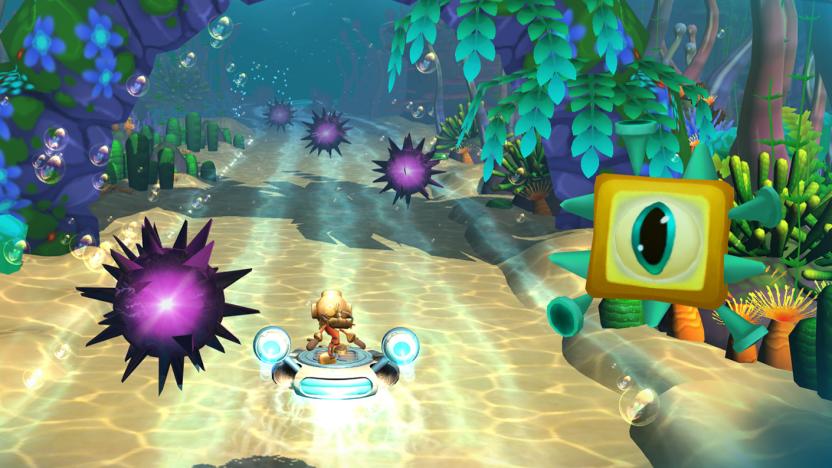adhd
Latest

CVS won’t fill prescriptions for controlled substances from two telehealth companies
It cited concerns with Cerebral and Done Health.

First FDA-approved prescription video game will help treat kids with ADHD
It’s entitled EndeavorRx, and while it’s not exactly comparable to your favorite AAA video games, it was designed to improve the attention function of kids with ADHD.

Study links ADHD symptoms in teens to frequent gadget use
Many people will tell you that teens' constant device use leaves them unable to focus, but is that actually the case? The answer is a giant "maybe." A newly published study in the Journal of the American Medical Association has linked Attention Deficit/Hyperactivity Disorder symptoms in teens to frequent device use. Out of 2,587 high school students studied over a two-year period, those who used multiple digital media types several times a day were about twice as likely to report strong ADHD-like symptoms (such as a lack of impulse control and patience) as their peers. The more digital media they used, the more likely it was that symptoms would surface.

Magnetic fields shut down speech, permit love songs (video)
You already know the strange powers of Stephin Merritt, but today we're talking about real magnetic fields. Powerful electromagnets, it turns out, can do remarkable things to the brain -- in this case, prevent a volunteer from reciting "Humpty Dumpty." The carefully directed magnets temporarily disrupt the brain's speech centers; the volunteer can still sing the rhyme using different areas of the brain, but simply can't overcome a series of stammers when trying to merely recite it. Of course, it's not all mad scientist applications: the UK team experimenting with transcranial magnetic stimulation (TMS) thinks it can help us understand and treat migraines (as we've seen before with the Migraine Zapper), depression, and ADHD, among other ailments. But improving physical well-being doesn't make for nearly as entertaining media -- see the British inflict some involuntary quiet time in the video above.

15 Minutes of Fame: WoW buoys autistic youngster
15 Minutes of Fame is WoW.com's look at World of Warcraft personalities of all shapes and sizes -- from the renowned to the relatively anonymous, from the remarkable to the player next door. Tip us off to players you'd like to hear more about. Should little kids play World of Warcraft? Players and non-players, parents and childless alike seem to relish pontificating. Ultimately, it all comes down to active parenting -- you have to judge whether your child's development and personality are suited for a dunk in the waters of a massively multiplayer world, and you have to stay plugged in, yourself. For WoW player Tsiva, mother of an 8-year-old with Asperger Syndrome, the decision to bring her son into the game has paid off. "It's helped with his reading, counting, confidence, motor skills and it's provided him with a heck of an incentive to work hard outside of the game," she reports. Tsiva's been blogging since last summer about her son's adventures in Azeroth, in the hopes that their experience will enlighten other players and spread awareness of the ways playing games like World of Warcraft can be a positive force for many children, including those with disabilities.

Quotient system electronically diagnoses ADHD, oh look a bunny
Cubicles are the site of many of the worst cases of adult attention-deficit hyperactivity disorder (ADHD), so it's perhaps a bit ironic that Quotient's ADHD System looks an awful lot like a cubicle on wheels. It's an automated machine that presents a series of games and challenges for a user to participate in, all while watching that user with a pair of cameras -- one up top to monitor head movement and one below to look for a bouncing leg. We think the same could be done far cheaper with a webcam and a Yurex leg odometer, but the FDA has recently seen fit to clear parent company BioBehavioral Diagnostics to start marketing this thing, so look for these to crop up in every elementary school faster than a twitchy kid can say Ritalin.

Game addiction on the rise, but 'stable' genes should prevent violent outbursts
When combined, a pair of new studies (conveniently stacked on GamePolitics.com) suggests that game addiction is a rising concern among American youth, but, if we also trust Aussie researchers, violent side effects are not. According to a new Harris poll, 8.5% of the US's youngsters are now clinically addicted to games, and as many as 23% have felt the jonesing itch for a fix. Thankfully, Australia's Swinburne University of Technology has published findings which indicate that violent games ('cause let's face it, violent games are the only kind American tweens get lifted on) don't increase the likelihood of a "stable" child becoming more aggressive.The Swinburne study seems to define "stable" as non-hyper. So, considering that about 7% of children are currently diagnosed with ADHD, presumably about 0.6% of America's young people (percentage of ADHD-diagnosed kids addicted to games) pose a potential threat to society. A small percentage no doubt, but with a reported 73.5 million children in the US in 2005, we could be living among something like 450,000 latent killer gamers -- hit the panic button![Disclosure: blogger's math skills have not been evaluated since December 1999; some calculations may be inaccurate. Call for panic still very real!]Read - Poll Indicates Game Addiction on the Rise Among YouthRead - Study Says Stable Kids Unaffected by Game Violence

Video games are the new Ritalin
Doctors are experimenting with a new Attention-Deficit Hyperactivity Disorder drug: video games. Using SMART BrainGames, a real brain training device, Dr. Margaret MacDonald is determined to show that ADHD sufferers can use video games to condition their brains to be more attentive; and do so without the aid of medications. But the treatment is pricey.The SMART BrainGames device is listed at $595 (PlayStation 2 version; console and games not included) and must be calibrated by a specialist. $595?! That thing best have some Blu-ray![Via Game Politics]

Artificial aid annoys user to counteract short-term memory loss
It's oftentimes tough to recall recent events, names, or gamertags while having a perfectly "normal" state of mind, but folks with brain damage, Alzheimer's disease, or ADHD are commonly plagued with the inability to bring back memories from just moments earlier. The function of the brain known as the "phonological loop" acts as a type of echo to hold snippets of pertinent information (such as phone numbers, directions, etc.) momentarily in your brain until you can get it written down; individuals suffering from short-term memory loss often lack this overlooked, but obviously critical, functionality. Daniel Bogen, a researcher at the University of Pennsylvania, has crafted a handheld device which acts as an aural stopgap to help people remember important information. The device boasts a speaker, microphone, and controls for recording / playback, and will automatically play reminders of the user's latest sound byte every two minutes, or if chosen, will nag its carrier to vocally repeat the message into the machine until he / she does so. To presumably prevent those amnesiac customers from perpetually misplacing their device, Bogen is considering integrating the hardware into "cellphones or wristwatches," but apparently forgot to mention when he hopes to see these in consumers' hands.






